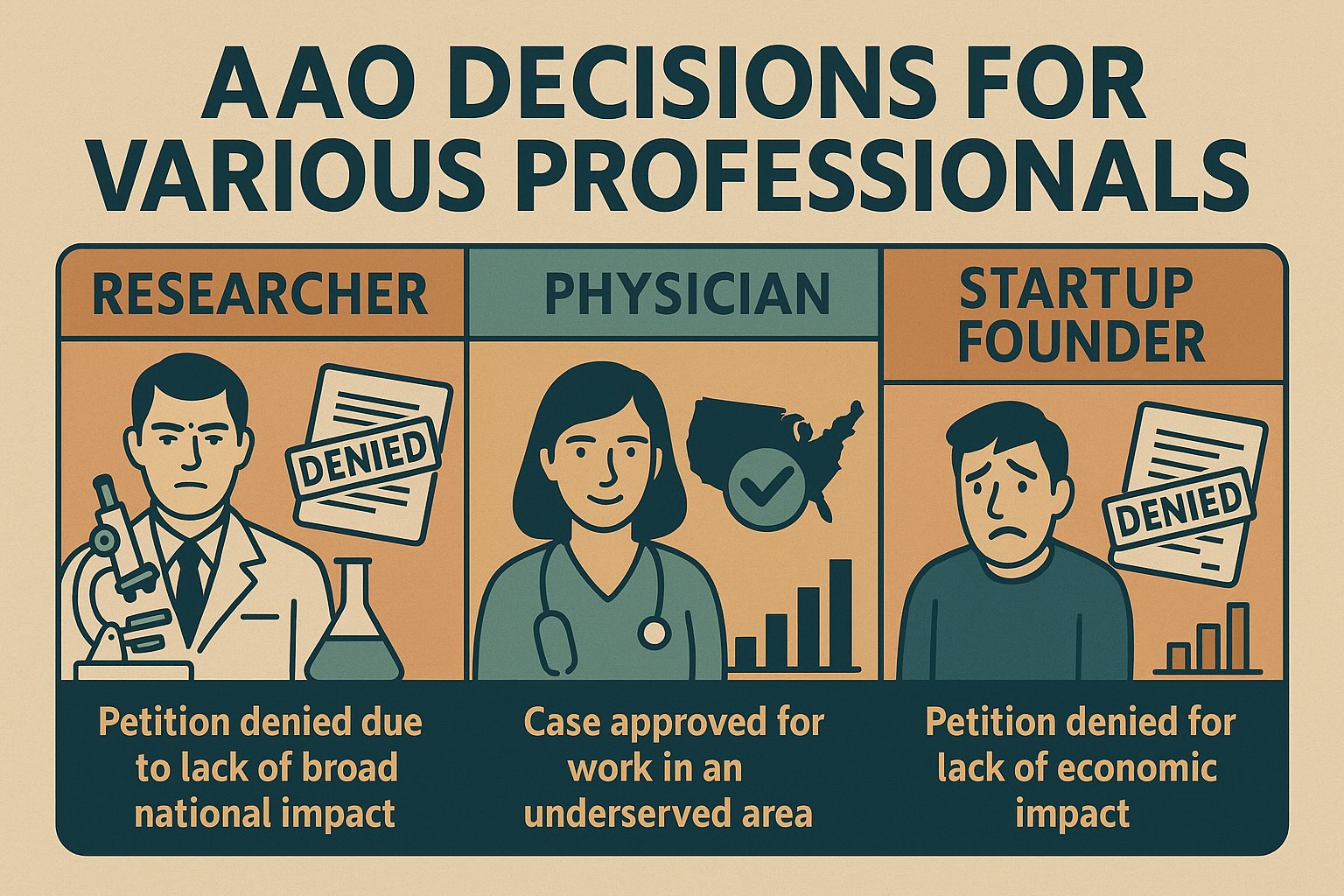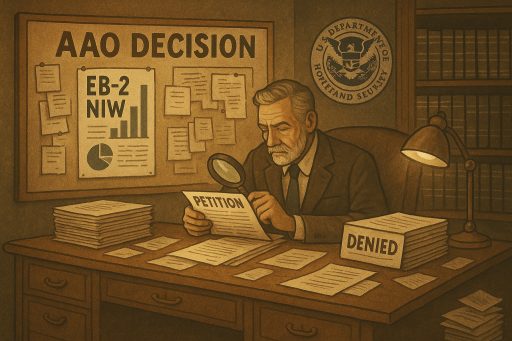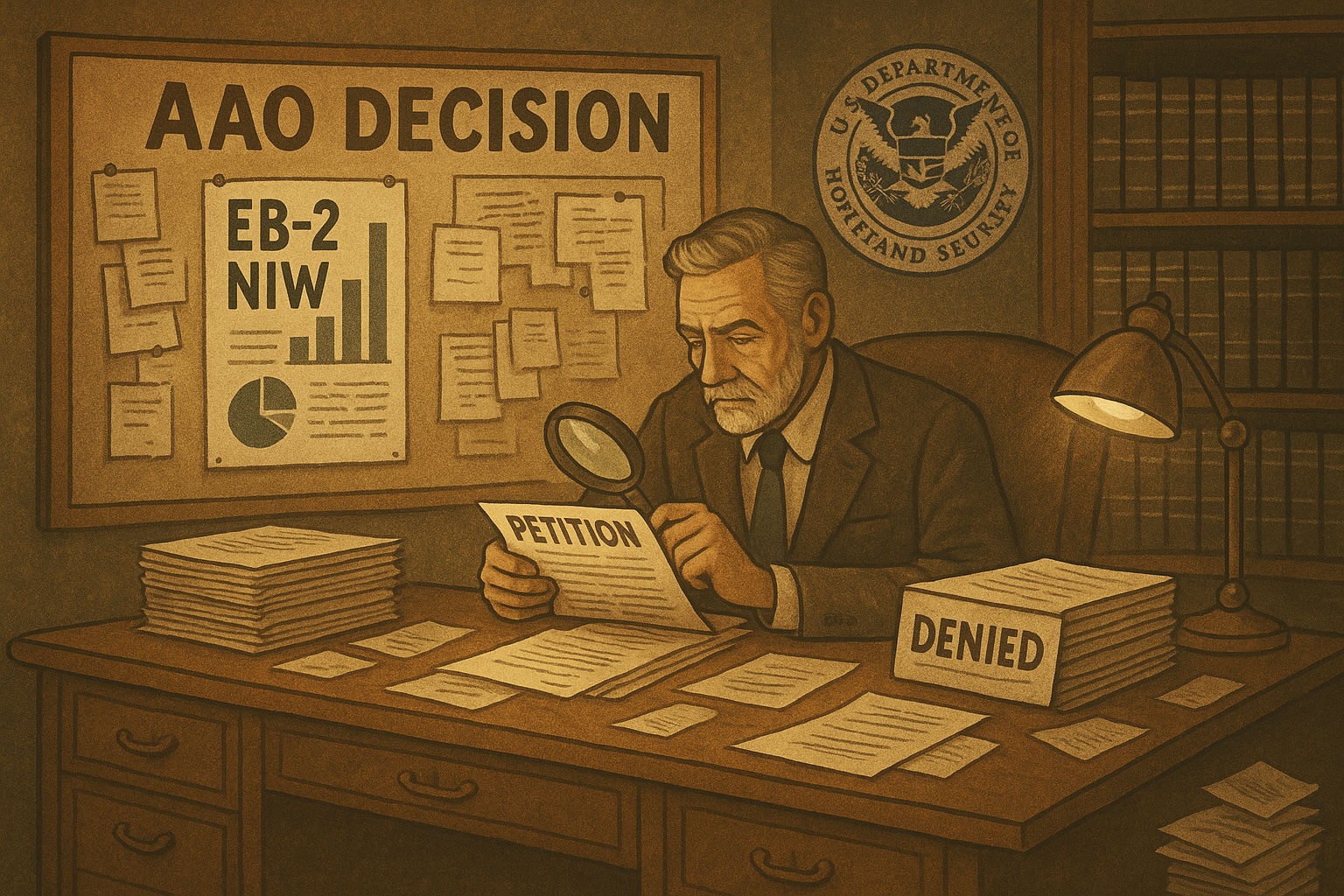EB2 NIW AAO decisions
Applying for a National Interest Waiver (NIW) under the EB2 visa category can be complex. Many applicants turn to Administrative Appeals Office decisions for guidance. The Administrative Appeals Office (AAO) reviews denied petitions and provides insights into how USCIS evaluates cases. Understanding AAO decisions can help applicants strengthen their I 140 petition letter package.
What is the Administrative Appeals Office?
The AAO is part of USCIS and reviews denied immigration petitions. Among others the immigrant petition for alien workers seeking a National Interest Waiver.
AAO issues both precedent and non-precedent decisions. Precedent decisions establish legal standards that all cases must follow. Non-precedent decisions apply only to specific cases but still provide valuable insights for visa applicants.
If USCIS denies a petition, applicants can appeal to the AAO. The office reviews the case, examines the evidence, and decides whether to uphold or overturn the denial. Many applicants study past AAO decisions to improve their EB2 NIW petitions and align them with USCIS standards.
We also trained our Selfpetition AI model on AAO non-precedent decisions. This helped us understand how to craft a winning proposed endeavor. It also revealed what USCIS looks for when evaluating substantial merit and national importance.
Our model helps applicants create stronger petitions that follow the latest AAO decision trends. This increases their chances of approval.
Why are AAO decisions important for NIW self petition?
USCIS officers get insights from previous AAO decisions when evaluating EB2 NIW green card petitions. These decisions outline key factors, including what qualifies as work of substantial merit and national importance. These decisions show how petitioners can prove their ability to advance their field in the U.S. They also highlight common reasons for denial and specify the required supporting documents for approval.
A self petition EB2 NIW allows applicants to apply without a job offer or labor certification requirement. Many applicants fail because of weak evidence or unclear explanations of their work’s impact. Reviewing AAO decisions helps EB2 NIW self petition applicants learn from past cases and strengthen their petitions.
Common issues in AAO non-precedent decisions
AAO decisions often cite similar key issues in I-140 NIW petitions. These issues include a weak or local impact rather than national importance. Many petitions also fail because of poorly defined endeavors or unclear future contributions.
Additionally, some applicants do not demonstrate sufficient expertise to advance their proposed endeavor. This is because providing education credentials is not enough. A job description alone also does not prove that the applicant is well positioned to advance the endeavor.
Finally, petitioners must show that their work on balance would be beneficial to the United States. Showing only a personal impact is unlikely to meet this standard.
Applicants need clear proof, such as published work, patents, or media recognition. They must also show future contributions with job offers, letters of intent, or industry endorsements. They must show that qualified U.S. workers cannot easily fill their role. Evidence may include unique expertise, leadership experience, or industry recognition.
Use AAO decisions to strengthen an EB2 NIW petition
To increase the chances of approval, applicants should research similar cases. Studying AAO decisions in their field can help identify what USCIS considers strong evidence. They must explain how their work benefits the U.S. in areas like the economy, healthcare, or education.
Supporting documents such as data, awards, publications, endorsements, or media features strengthen the case. Many EB2 NIW green card denials stem from similar mistakes. Learning from AAO non-precedent decisions can help applicants preemptively resolve potential weaknesses in their petition.
AAO decisions for various professionals
The Administrative Appeals Office has reviewed cases from various industries.
- USCIS denied a researcher’s petition because they failed to prove a broad national impact. The AAO decision upheld the denial, emphasizing the need for documented industry influence.
- A physician working in an underserved area successfully proved their work met National Interest Waiver criteria. USCIS approved the case because the petitioner demonstrated a clear public benefit.
- USCIS denied a startup founder’s petition because of insufficient proof of economic impact. The AAO decision stated that financial projections alone were insufficient without proof of job creation or economic impact.

Petitioners shall study AAO decisions to understand what makes an EB2 NIW case strong or weak.
Key takeaways
AAO non-precedent decisions show several important lessons. The petitioner must show their work has a broad national impact. Immigration letters of recommendation, expert opinion letters, patents, awards or media articles can make a difference.
Petitioners must show past success. They must prove their ongoing contributions in the United States. They also need to show why their skills are unique and how they meet the visa EB2 National Interest Waiver criteria. A well-structured petition following AAO guidance improves approval chances.
For those self petitioning for a green card, understanding AAO non-precedent decisions can become a significant help. By analyzing past rulings, applicants can craft stronger EB2 NIW I 140 petitions that align with USCIS expectations. A well-prepared petition letter package improves the chances of self petition EB2 NIW approval.
If you are considering green card self sponsorship, take the time to study AAO decisions. Doing so can help you avoid common pitfalls and present a compelling case to USCIS.
A successful self sponsored green card application requires careful planning, strong evidence, and strategic presentation of expertise. Petitioners can use insights from AAO decisions to improve their chances of approval. This helps them move closer to becoming a lawful permanent resident.














